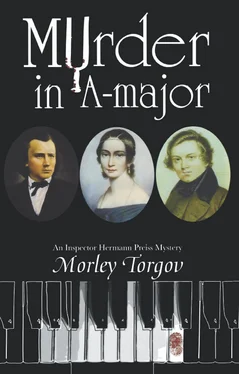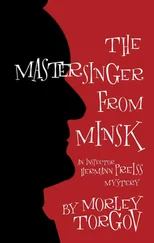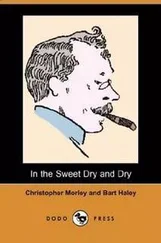Morley Torgov - Murder in A-Major
Здесь есть возможность читать онлайн «Morley Torgov - Murder in A-Major» весь текст электронной книги совершенно бесплатно (целиком полную версию без сокращений). В некоторых случаях можно слушать аудио, скачать через торрент в формате fb2 и присутствует краткое содержание. Жанр: Исторический детектив, на английском языке. Описание произведения, (предисловие) а так же отзывы посетителей доступны на портале библиотеки ЛибКат.
- Название:Murder in A-Major
- Автор:
- Жанр:
- Год:неизвестен
- ISBN:нет данных
- Рейтинг книги:5 / 5. Голосов: 1
-
Избранное:Добавить в избранное
- Отзывы:
-
Ваша оценка:
- 100
- 1
- 2
- 3
- 4
- 5
Murder in A-Major: краткое содержание, описание и аннотация
Предлагаем к чтению аннотацию, описание, краткое содержание или предисловие (зависит от того, что написал сам автор книги «Murder in A-Major»). Если вы не нашли необходимую информацию о книге — напишите в комментариях, мы постараемся отыскать её.
Murder in A-Major — читать онлайн бесплатно полную книгу (весь текст) целиком
Ниже представлен текст книги, разбитый по страницам. Система сохранения места последней прочитанной страницы, позволяет с удобством читать онлайн бесплатно книгу «Murder in A-Major», без необходимости каждый раз заново искать на чём Вы остановились. Поставьте закладку, и сможете в любой момент перейти на страницу, на которой закончили чтение.
Интервал:
Закладка:
This was the hospital of Dr. Franz Richarz, the domain of perhaps the only psychiatrist in Germany, indeed in Europe, who at the moment regarded mental illness as exactly that-an illness-rather than some form of moral failure or punishable evil.
The main building was a two-storey structure Dr. Richarz had remodelled to house no more than fourteen psychiatric patients. I presented my credentials to the doctor at his office on the ground floor. “I apologize,” I said to him, “for not communicating with you in advance about my plan to visit Dr. Schumann, but the pressures of my occupation are such that I never know from one day to the next…”
Dr. Richarz's eyes struck me as the kind that were capable of looking not only directly at me but through me, and whether or not he believed my flimsy excuse, he graciously accepted it. “I am aware of your interest in Dr. Schumann's troubles,” he acknowledged with a forgiving nod, “and, if you will pardon me for saying so, the only surprise is that you didn't come to see him sooner.”
His tone, though gentle, seemed to call for an apology for this, too. “Police inspectors are not prized, I'm afraid, for their hospital visitations,” I said. “Usually when we show up at someone's bedside, we serve only as a grim reminder of some crime that's been committed.”
The doctor gave me a warm smile. “No fear of that here, Inspector Preiss. Dr. Schumann is not bedridden…at least not much of the time, only occasionally…and I'm certain he'll be glad of the company. Let me escort you to his room.”
Mounting the broad stairway that led to the second storey, I asked if Schumann received many visitors. “Not many,” Dr. Richarz replied, “but the few who come are obviously close to him and of great importance to him, which is gratifying not only to the patient but to me as his doctor. It is so vital that he remain connected to the world outside, you see. Much of the treatment I render is based precisely on personal contacts being maintained as often as possible between the patient and his family and friends and professional colleagues.” At this point, Dr. Richarz halted suddenly and looked intently into my face. “Please understand, Inspector…Robert Schumann is not a freak.”
“But I never thought of him as a freak.”
“Others did. Others still do. I'm sorry if I offended you, Inspector Preiss.” We continued up the stairs. “Fortunately, his friend Brahms and his favourite violinist Josef Joachim visit fairly frequently. Paul Mendelssohn, the brother of the late Felix, sends letters, and I happen to know that he has assisted Madam Schumann financially because of her worries about money. A woman by the name of Bettina von Arnim paid him a visit not long ago; I gather, however, that, unlike the others, she was not favourably impressed with our facilities, nor with me apparently. Word got back to me that she found everything here, to quote her, ‘dreary’.” At the top of the stairs, the doctor paused again, and sighed. “I like to think that I've made some progress discerning the human mind, but women? ”
We both laughed, but the truth was, as we approached the door to Schumann's room, I had an increasingly uneasy feeling about what I would find there.
Whatever fears I had vanished the moment the door opened. Schumann's bedroom, it turned out, was flooded with sunlight that poured through a generous pair of windows. Facing south and east, they offered a fine landscape, with mountains along the Rhine forming a backdrop. Opened wide, they permitted a gentle breeze to enter the room. The furnishings-a small writing table, a chest of drawers, several chairs, a bed with a handy night table-though modest, were almost pristine. Altogether these quarters were a far cry from the accommodations I had seen from time to time in my visits to asylums supported by the state, institutions whose long, dark corridors reeked of overcooked food and unemptied chamber pots and teemed with grotesque men and women milling aimlessly about, some muttering, others screaming, the air filled with hopelessness.
As I stepped into Schumann's room, I found him standing at one of the windows taking in the view, his back to me. Dr. Richarz called out “Maestro, you have a visitor.” Then, in a whisper, he said to me, “I'll leave you two alone; I'm sure you have much to talk about. Do take your time, Inspector.” I thanked him, watched him make his exit, quietly closing the door behind him, then called out, “Good afternoon, Maestro.”
Schumann remained standing at the window, his back still to me. “Why do I know that voice?” he called back. Then, very slowly, he turned to face me. Several times he blinked, then shut his eyes tightly, then re-opened them, like a blind man suddenly regaining his sight. His mouth twisted into a suspicious smile. “I believe I have been blinded by the sun. Or maybe you're an apparition. Is it really you, Preiss?”
“It is I, Maestro. Inspector Hermann Preiss…at your service, sir.”
Schumann let out a cynical laugh. “At my service, you say? You mean you're finally getting around to arresting me, then.”
“Good God, no!” I said. “I give you my word-”
“Your word? If memory serves, your word has a tendency to evaporate much the way a spy's ink becomes invisible. Your word, if I recall correctly, does not always stand up when exposed to air and light.”
“Please believe me, Dr. Schumann,” I said, “this is strictly a social call.”
“A social call? Inspector Hermann Preiss, one of Düsseldorf's finest, travels all the way to Endenich to make a social call, eh? Well now, I suppose we should pull over a couple of comfortable chairs, sit ourselves down, and have a nice chat about the good old days…not that there were many. Tell me, Preiss, how is everyone back in Düsseldorf?”
“You mentioned chairs, Maestro Schumann. I could use one right about now. It's already been a rather long day, you understand.”
“Oh, I do beg your pardon, Inspector.” Schumann reached for a chair, offered it to me, then took one for himself. His apology, and his movements-all haste and flourish-struck me as false. “There now, that's better,” he said. “You were about to bring me up-to-date on people and events back home. Let's start out at the lowest level, in the underground tunnels and sewers.”
“You're referring to?”
“Wieck and Hupfer, of course.”
“Let me begin with Hupfer,” I said. “You may recall, Maestro, that a family by the name of Steinweg-a father and two or three sons-became well-known builders of excellent pianos in the vicinity of Hamburg. Well, the family moved not long ago to the United States of America, to New York City in fact, and established a piano factory there. Apparently, the Americans are becoming increasingly civilized, not to mention wealthy, and are fond of adorning their parlours with none but the finest instruments. The Steinwegs changed their name to Steinway, presumably to blend in better with New York high society.”
Schumann's face broke into a wise smile. “Surely, Inspector, you're not going to tell me Hupfer's working for them in America.”
“He's not only working for them, Maestro, he's their chief technician.”
“Their chief technician! Tell me more, Preiss. What of my dear father-in-law? What's that creature up to these days?”
“Professor Wieck? Not much. Apparently, he's badly crippled. Arthritis, you know. No longer able to teach, I hear. It may please you a bit to know that Madam Schumann has made it clear her father is no longer welcome in the Schumann household.”
“It pleases me more than a bit, Inspector,” Schumann said. As though speaking to himself, he said in a quiet voice, “And God fulfills Himself in many ways.”
Читать дальшеИнтервал:
Закладка:
Похожие книги на «Murder in A-Major»
Представляем Вашему вниманию похожие книги на «Murder in A-Major» списком для выбора. Мы отобрали схожую по названию и смыслу литературу в надежде предоставить читателям больше вариантов отыскать новые, интересные, ещё непрочитанные произведения.
Обсуждение, отзывы о книге «Murder in A-Major» и просто собственные мнения читателей. Оставьте ваши комментарии, напишите, что Вы думаете о произведении, его смысле или главных героях. Укажите что конкретно понравилось, а что нет, и почему Вы так считаете.












